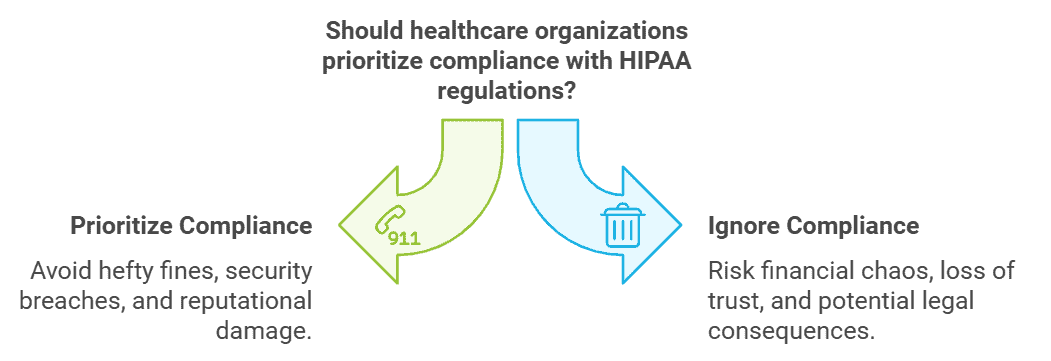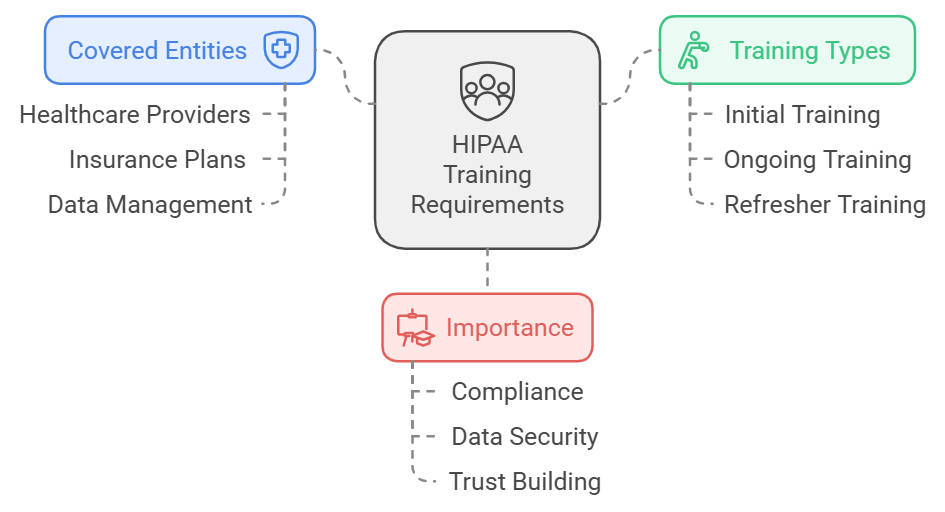Importance of Compliance in Healthcare
Let’s chat about the maze of healthcare compliance. It’s like herding cats – everyone on the team has got to do their part to keep things running smoothly. Compliance is more than just ticking boxes, like ensuring HIPAA doesn’t come knocking at your door.
Business Implications of Compliance
In the healthcare biz, playing by the rules isn’t just about keeping Uncle Sam off your back. It’s about keeping your practice’s name out of the mud. Non-compliance can hit your wallet hard and ruin your street cred. Think of it this way: if you’re not following the rules, you’re looking at costs skyrocketing to about 3.5 times what compliant businesses face, averaging $9.6 million in damages (PowerDMS). That’s a heavy price tag that can shake the very foundation of your practice, making compliance a must-do, not a nice-to-have.
Wide Range of Regulatory Requirements
HIPAA’s just the tip of the iceberg. You’ve got federal rules, state laws, accreditation standards, internal giggle sheets, and even OSHA breathing down your neck. Every one of these rules has a job – keep patient care top-notch, protect sensitive info, and keep the legal folks happy (PowerDMS).
Trying to keep up with all the rules can make your head spin, but it’s crucial for looking after your patients, guarding precious data, and keeping your practice out of the courtroom spotlight. Medical practice administrators and staff should be like sponges, soaking up knowledge about these compliance standards and using them like building blocks to reinforce every corner of the practice.
When practices wear compliance like a coat of armor, they build trust with patients and set them up for success in a world where rules and regulations reign. If you’re on a mission to train your administrative staff like the A-team of compliance superheroes, check out our article on best practices for training administrative staff in medical practices.
Consequences of Non-Compliance

In the world of healthcare, dodging those pesky regulations, like HIPAA, isn’t just playing with fire—it’s practically inviting flames. Ignoring the rulebook isn’t just a slap on the wrist; it’s a deep dive into a pool of financial chaos and trust issues.
Financial Implications
When it comes to money, non-compliance in healthcare is costly. If you need to play by the rules, you’re looking at costs about 3.5 times heftier than the good rule-followers, landing you with a bill averaging around $9.6 million (PowerDMS). HIPAA fines alone can shoot up to a wallet-sapping $1.5 million per blunder each year. Take 2018, for instance: the Department of Health and Human Services Office for Civil Rights dished out over $28 million in fines.
If you mess with patient information, you’ll face fines ranging from $100 to $1.5 million, plus possible jail time, up to 10 years. So, adhering to HIPAA isn’t just for laughs; it’s do-or-die for any healthcare outfit aiming to keep its financial ship afloat.
Security Breaches and Reputational Damage
Non-compliance with HIPAA isn’t just a numbers game—it’s also a trust buster. Breaches can spill the beans on sensitive patient information, letting trust drain out faster than a leak in a boat and leaving the organization open to lawyers circling like sharks.
Ignoring the rules can lead to a whole basket of nasty outcomes: licenses might disappear, operations might screech to a halt, patient care might go south, and trust might vanish like a magician’s rabbit. The hit to an organization’s rep can be a straight shot to losing patients and referrals.
Keeping up with all the PINs and regulations is about more than just avoiding fines. Understanding what non-compliance costs—cash and security—means ensuring everyone, from the top brass to the new hires, knows the playbook. Investing in solid training programs and nurturing a compliance-first mindset is like an insurance policy for your organization’s finances and reputation in the wild, busy world of healthcare.
Understanding HIPAA Compliance
In the hustle and bustle of healthcare, getting a grip on HIPAA compliance is your go-to move to keep patients’ information down and stick to the rules. Here’s the lowdown on what you should know about the guidelines, the wallet-hitting fines tied to them, and the rights your patients have under HIPAA.
HIPAA Mandates and Fines
If you feel formal, HIPAA or the Health Insurance Portability and Accountability Act sets the ground rules for keeping patient health info under wraps. Slip up, and you’re staring down fines that might hit a staggering $1.5 million per incident yearly. In 2018, a whopping $28 million in penalties was slapped on folks who didn’t play by the HIPAA rulebook.
Anyone dealing with Protected Health Information (PHI) must keep it safe, private, and intact. Messing around with HIPAA can land a hefty punch: financial smackdowns and maybe even criminal charges. Medical pros must get HIPAA-savvy to avoid leaks and keep patient hush-hush matters private.
Patient Rights under HIPAA
HIPAA hands the steering wheel to patients regarding their health info, laying down rights they can count on. Patients can get their mitts on their health records within 30 days of asking. This is handy for them to hand over their health history to new docs for smooth, nonstop care. Companies can only sneakily use patient data for ads, raising funds, or research if you’ve nodded your head to it.
Patients have a say in how their information is used, giving them the power to monitor their privacy decisions. By putting patient rights front and center, healthcare folks show they’re all in for ethical, patient-focused care. Clueing the staff about these rights isn’t just a good idea; it’s a must-do to stay in HIPAA’s good graces and keep the patient-private-info trust bond strong.
Make sure your crew is participating in HIPAA training—it’s not just suggested; it’s the law. Want more details on ensuring healthcare administrative staff are properly trained? Read our article on best practices for training administrative staff in medical practices.
HIPAA Training Requirements

Keeping up with the Health Insurance Portability and Accountability Act (HIPAA) is crucial for protecting patient information in healthcare settings. Part of this responsibility is making sure everyone is properly trained so they adhere to the privacy and security rules HIPAA lays out.
Training for Covered Entities
We’re talking about healthcare providers, insurance plans, and cleaning up healthcare data messes. These folks are covered entities, and they have to make sure their crew is up to speed on the ins and outs of dealing with private health information. It’s about ensuring everyone knows their job in keeping patient data safe.
According to the Privacy Rule, each covered entity must tailor HIPAA training to fit what each worker does on the job. This way, everyone knows exactly how to keep patient information under wraps. Now, the Security Rule says everyone, no matter their access to sensitive health information, needs to go through training. This approach ensures that the whole outfit is defending health information properly.
Importance of Ongoing Training
HIPAA training isn’t something you do once and forget; it’s a constant process to keep the crew informed about the newest rules and intelligent practices. When a new person joins, they should get their HIPAA training not too long after they start.
Doctors, nurses, and healthcare teams should go through annual HIPAA sessions to keep their knowledge fresh about privacy and security shortcuts. Plus, if there’s a switch in how things are done, some new tech pops up, or new regulations from the Department of Health and Human Services (HHS), more training needs to happen. Having at least one bigwig from management in these sessions also shows that the place means business regarding HIPAA compliance.
Normally, employers offer two flavors of HIPAA training to healthcare workers: one on privacy rules around policies and procedures and the other on security awareness (HIPAA Journal). Refreshers come into play when there’s any shakeup in HIPAA policies and procedures to keep everyone on the straight and narrow with the latest regulations.
Ensure HIPAA Compliance with Effective Training
Protecting patient data is crucial for every healthcare practice. Implementing the right HIPAA training ensures security, compliance, and peace of mind. Contact Karma Health today to learn how we can help you safeguard patient information with comprehensive HIPAA training for your staff!




